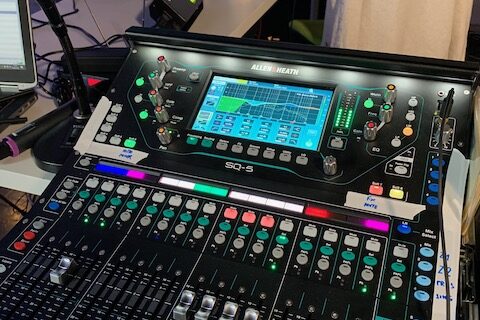Who needs sound engineering lessons? Learning to engineer sound for a band – like many things – looks deceptively simple.
Plug in, turn on, turn up – right?
Then you find you get feedback, things don’t sound so clear, and what order should you set everything up anyway? It’s time to get some sound engineering lessons.
Layout and Stage Volume
High stage volume usually comes from guitar amps and drums. This makes it difficult to hear everything on stage. When sound bleeds into a microphone meant for something else, this causes problems getting a clean mix. When a lot of stage sound reaches the audience directly, it’s also harder to get a good front-of-house (FOH) mix.
So…
- Keep the drumming to a sensible volume (except on the biggest of stages); go easy on splash cymbal use
- Try and physically separate the drums from the vocal mics, and arrange the vocal mics to point away from the drums
- For guitar amps, raise them and/or tilt them so they point straight at the guitar player. This way you can turn the guitar amp down. Also, consider pointing the amp across the stage (not at the audience) then you can mic up the cabinet and add it back to the FOH mix in a controlled way.
- Similar for bass amps: so long as you have a PA with reasonable power, run the bass amp as low as the bass players allows, then DI it into the PA. Then you can balance the bass in the FOH mix.
Very commonly, the loudest thing on stage is what determines the required overall volume of the FOH mix. Essentially, everything other performer has to be made loud enough to compete. Sometimes you’ll hit the limits of your PA before you manage it.
Get these things sorted before moving on…
What Can I Put Through the PA?
There are some limiting factors on what you can put through your PA.
- How many input channels you have
- How many mics or DIs you have
- How loud the PA can go
| PA (Examples) | What you could amplify |
| Lightweight or busking PA, e.g. Yamaha STAGEPAS. | Probably just vocals, but probably not even that if you have live drums |
| Entry-level 12″ active cabinets, e.g. Alto TS312, Electrovoice ZLX, JBL EON, Yamaha DBR, RCF ART 312 | Vocals, guitar, keys, horns. Potentially a little bass and drums. |
| High-power 12″ active cabinets, e.g. QSC K12.2, Electrovoice ETX, JBL SRX, Yamaha DXR | Everything, if you want |
| As per above two rows, but with decent 15″ or 18″ subs | Everything, but with more deep bass extension |
Occasionally I’ve come across very cheap Skytec or Behringer cabinets. They haven’t been loud enough to be useful for bands with drum kits, and/or have a very uneven frequency response that tends to cause feedback. Save up more money.
Now you have a PA system…
What Do I Need to Learn About Sound Engineering?
OK, so here are some of the things I will teach people about live sound engineering. You can also learn a lot about these topics online, from other bands and musicians, or sometimes in college. More often I just fill in the gaps or show how the theory works for your application!
- Different microphone types and which ones suit you (I can let you try alternatives from my set)
- Minimising feedback
- What a DI box does and why you might need one
- Differences when mixing on a digital mixer
- Sound mixer concepts (basics)
- Gain staging and levels
- Signal flow
- How to EQ inputs and outputs
- How to set up mixes/busses for monitoring and effects
- Monitoring on headphones
- Sound mixer concepts (next level)
- Setting up and monitoring compressors
- Gates and expanders
- Mute groups
- Sound mixer concepts (taking more control)
- Setting up and using DCAs
- Setting up and using groups
- Saving and recalling scenes and settings
- Setting up a mixer in a real sound check
- Setting up and testing your PA system
- Equipment management (inc. cable care and labelling)
- Radio mic configuration
- Working with other acts and providers, and creating your stage plot
Get Lessons
If you’re in Devon and would like sound engineering lessons to learn more about sound engineering for live music or other live events, contact me.
Every session is bespoke, so I need to find out what you want to learn. I like to teach in a practical way with demonstration, but will also draw on a whiteboard if we have concepts to build on.
I can bring equipment to try or help with the sessions, for example:
- Does a more expensive mic help? Let’s listen to both
- Would better speakers help? Let’s compare out loud
- Would a better mixer help? Let’s build a mix on both
Generally, I’ll come to your location in Devon, especially Exeter, Torbay or Plymouth.

